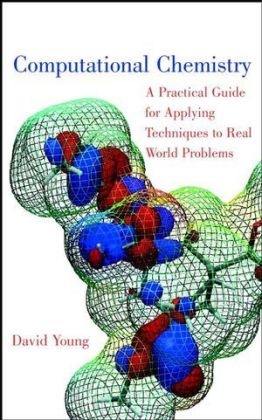Share
Fr. 240.00
Young, David Young, David (Cytoclonal Pharmaceutics Inc.) Young, David C. Young, DC Young, Robert Young
Computational Chemistry - A Practical Guide for Applying Techniques to Real World Problems
English · Hardback
Shipping usually within 1 to 3 weeks (not available at short notice)
Description
Zusatztext "...offers a research guide rather than a primary text...students might find some of the material useful...explains to chemists how to use computational techniques to address real-world research problems." (SciTech Book News! Vol. 25! No. 4! December 2001)"If you're looking for an aggregation of what's out there! and a starting point for further reading or research! then this book does a pretty good job." (Chemweb - Alchemist! 11 February 2002) Informationen zum Autor Best-selling author, Mila Young tackles everything with the zeal and bravado of the fairytale heroes she grew up reading about. She slays monsters, real and imaginary, like there's no tomorrow. By day she rocks a keyboard as a marketing extraordinaire. At night she battles with her mighty pen-sword, creating fairytale retellings, and sexy ever after tales.¿ Klappentext A complete bench-top guide to basic and advanced techniques used to solve real world research problems Thanks to the proliferation of inexpensive, easy-to-use computational chemistry programs, the average laboratory chemist now has access to powerful tools once reserved solely for highly trained specialists. Computational Chemistry was designed specifically to enable chemists to add computational chemistry techniques to their working arsenal. This book supplies the expert advice and guidance needed to confidently choose and successfully apply the correct computational chemistry techniques to an array of real world scientific problems. Computational chemist David Young provides clear-cut descriptions and step-by-step instructions for solving technical problems. He explores basic techniques in the field with a focus on their relative strengths and limitations. In addition, Young treats a range of advanced techniques from an easy-to-understand, nonmathematical standpoint, including transition structures, reaction coordinates, reaction rates, convergence problems, QM/MM, solvation, nonlinear optical properties, relativistic effects, mesoscale methods, and more. Computational Chemistry features: * Prioritized lists of methods for attacking difficult computational chemistry problems * Brief critical reviews of most commercially available software packages, assessing each for its overall effectiveness and practical utility * A review of the material from the perspective of various chemical systems (such as organic molecules, inorganics, biomolecules, polymers, liquids, or solids) Zusammenfassung Wie wendet man Methoden der Computational Chemistry korrekt auf chemische Alltagsprobleme an? Dieser Band erläutert diese Thematik einprägsam, verständlich und leicht nachvollziehbar. Fortgeschrittene Algorithmen werden mit einem Minimum an mathematischem Formalismus erklärt, unterschiedliche Näherungsansätze in praxistauglicher Form miteinander verglichen. Ein Buch für den Praktiker, der sich schnell einen Überblick verschaffen will, welche Methoden für welches Problem angemessen sind. Inhaltsverzeichnis PREFACE xvii ACKNOWLEDGMENTS xxi SYMBOLS USED IN THIS BOOK xxiii 1. Introduction 1 Part I. BASIC TOPICS 5 2. Fundamental Principles 7 3. Ab initio Methods 19 4. Semiempirical Methods 32 5. Density Functional Theory 42 6. Molecular Mechanics 49 7. Molecular Dynamics and Monte Carlo Simulations 60 8. Predicting Molecular Geometry 67 9. Constructing a Z-Matrix 73 10. Using Existing Basis Sets 78 11. Molecular Vibrations 92 12. Population Analysis 99 13. Other Chemical Properties 107 14. The Importance of Symmetry 125 15. Efficient Use of Computer Resources 128 16. How to Conduct a Computational Research Project 135 Part II. ADVANCED TOPICS 145 17. Finding Transition Structures 147 18. Reaction Coordinates 159 19. Reaction Rates 164
List of contents
Preface.
Acknowledgments.
Symbols Used in This Book.
Introduction.
BASIC TOPICS.
Fundamental Principles.
Ab initio Methods.
Semiempirical Methods.
Density Functional Theory.
Molecular Mechanics.
Molecular Dynamics and Monte Carlo Simulations.
Predicting Molecular Geometry.
Constructing a Z-Matrix.
Using Existing Basis Sets.
Molecular Vibrations.
Population Analysis.
Other Chemical Properties.
The Importance of Symmetry.
Efficient Use of Computer Resources.
How to Conduct a Computational Research Project.
ADVANCED TOPICS.
Finding Transition Structures.
Reaction Coordinates.
Reaction Rates.
Potential Energy Surfaces.
Conformation Searching.
Fixing Self-Consistent Field Convergence Problems.
QM/MM.
Solvation.
Electronic Excited States.
Size Consistency.
Spin Contamination.
Basis Set Customization.
Force Field Customization.
Structure--Property Relationships.
Computing NMR Chemical Shifts.
Nonlinear Optical Properties.
Relativistic Effects.
Band Structures.
Mesoscale Methods.
Synthesis Route Prediction.
APPLICATIONS.
The Computational Chemist's View of the Periodic Table.
Biomolecules.
Simulating Liquids.
Polymers.
Solids and Surfaces.
Appendix: Software Packages.
Appendix 1: Integrated Packages.
Appendix 2: Ab initio and DFT Software.
Appendix 3: Semiempirical Software.
Appendix 4: Molecular Mechanics/Molecular Dynamics/Monte Carlo Software.
Appendix 5: Graphics Packages.
Apendix 6: Special-purpose Programs.
Glossary.
Bibliography.
Index.
Report
"...could be read cover to cover, providing...important insights...could serve as an excellent reference volume...both researchers and students would find it valuable.... I would consider it essential to have on the shelf..." (Journal of the American Chemical Society, Vol. 123, No. 41, 2001)
"...offers a research guide rather than a primary text...students might find some of the material useful...explains to chemists how to use computational techniques to address real-world research problems." (SciTech Book News, Vol. 25, No. 4, December 2001)
"If you're looking for an aggregation of what's out there, and a starting point for further reading or research, then this book does a pretty good job." (Chemweb - Alchemist, 11 February 2002)
Product details
| Authors | Young, David Young, David (Cytoclonal Pharmaceutics Inc.) Young, David C. Young, DC Young, Robert Young |
| Publisher | Wiley, John and Sons Ltd |
| Languages | English |
| Product format | Hardback |
| Released | 12.04.2001 |
| EAN | 9780471333685 |
| ISBN | 978-0-471-33368-5 |
| No. of pages | 408 |
| Series |
A Wiley-Interscience Publication A Wiley-Interscience Publication |
| Subjects |
Guides
Natural sciences, medicine, IT, technology > Chemistry > Physical chemistry Chemie, SCIENCE / Chemistry / General, SCIENCE / Laboratory Techniques, chemistry, Scientific equipment, experiments and techniques, Computational Chemistry, Computational Chemistry u. Molecular Modeling, Computational Chemistry & Molecular Modeling |
Customer reviews
No reviews have been written for this item yet. Write the first review and be helpful to other users when they decide on a purchase.
Write a review
Thumbs up or thumbs down? Write your own review.

